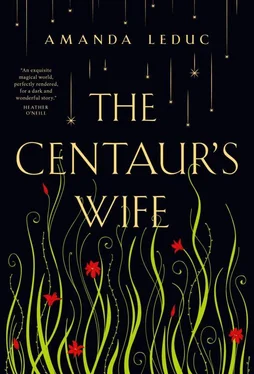Amanda Leduc
THE CENTAUR’S WIFE
For Jess, always and forever
To survive is an astonishing gift. The price of that gift is memory.
—D.A. Powell,
Tea
In the beginning, a horse fell in love with a woman. Because magic was strong in the ground there, the horse dug himself a grave on his mountain and slept in it, buried in the dirt, on the one night a year when the stars are at their brightest. In the morning, he climbed out of the dirt as a man and made his way down the mountain. He stole clothes from a line when no one was looking and learned human language by watching men and women in the market square. The mountain’s magic was still with him, so he learned quickly, and by the time he reached the woman’s village you would never have guessed that he still had the heart of a stallion.
He’d been beautiful as a horse—black-maned and black-skinned, a white star in the centre of his forehead—and he was beautiful as a man, black-skinned and tall, a shock of white in his dark hair. The woman fell in love with him almost right away. He seemed wild to her but also familiar—she sensed a power in him that she wanted for herself, a different set of eyes with which to view the world. They courted and were married before the moon changed. The entire village came out to the wedding. After the music and the dancing were over, the villagers left them in the wedding tent—bright-eyed and flushed, two very-nearly strangers who were surprised to find themselves alone.
The woman was so beautiful he was afraid to touch her. She had lilies in her soft blonde hair and designs painted up and down her arms. The designs asked for happiness, health, children, an ever-loving husband—all of the good things anyone might wish a bride. The husband felt the symbols reach out and touch his stallion’s heart for the smallest of instants—felt them know, and pull away. A draft blew through the room, then the air cleared again.
In less than a month, the woman was pregnant. The pregnancy was hard but not unbearable, and the husband was so besotted with his wife, so fearful for her safety, that he carried her almost everywhere they went. In time she grew so big the villagers began to prepare for triplets. A neighbour fashioned a cart like a rickshaw, so when his wife became too big for him to carry, the husband could pull her around like a queen. Sometimes he gave the village children rides when they asked. Sometimes, when his wife was in pain, he did not.
She was pregnant for longer than usual. As her belly grew enormous, the rest of her became a shadow. When her time finally came, the panic in her blue eyes made the village midwives nervous, and so the elders sent for one of the doctors who travelled the countryside. Sometimes women left when children came into the world, and they weren’t about to let that happen. The doctor was also a woman. She was kind and gentle, with hands that were as strong as those of any man in the village, except perhaps the wife’s own husband.
The wife had gone into labour in the morning and struggled all that day and into the next. You could see the babies in her belly, trying to break through this last membrane, their sharp little fists and heels making bumps beneath her skin. But try as she might, she couldn’t push them out. After the second morning, the doctor placed a hand inside the wife and felt legs where a baby’s head needed to be.
“The first is breech,” she said, “and I can’t turn it. I’ll have to operate.”
No one in the village had ever seen an operation of any kind, and people crowded around the door and the windows. Everyone was worried. Would the babies survive? Would the wife? No one could bear to look at the anguish in the husband’s face.
But the doctor was the best, or so they’d been told, and she did not seem worried. She numbed the wife with drugs as best she could, then took her scalpel and made the first incision, quick and clean. Blood beaded up and ran down the wife’s belly.
As she worked, the doctor hummed a wordless song to calm the wife. “Three cuts,” she said, and smiled. “Three doors into the world for three special babies.” Her second incision pierced the fascia. The crowd had gone quiet, the only noise the doctor’s humming and the soft sounds of tissue giving way.
At the third cut, her scalpel gently slit the uterine wall. She did not stop humming. She set down her knife, pressed down and pushed in and scooped out the first baby.
The house went still for the smallest of moments. And then the screaming started.
The babies—and there were three of them—were red and squalling, one darker, two pale, all with the wife’s blue eyes and a perfect, plump little torso atop the body of a tiny horse. Each leg, slick with mucus, ended in a dark little hoof. A tiny girl, two tiny boys. The midwives all ran for the door. Monsters! they cried as they fell outside. They are monsters! Heaven help us. Get them away! When the villagers tried to rush inside, the husband roared with fury and blocked the way.
The doctor—whose hands didn’t shake, even now—laid each baby on the table, one by one. Then she turned back to the wife, still humming, and stitched up her wound as though nothing had happened. The wife, whose eyes were wide with terror, looked from the doctor to the babies and back, over and over. She didn’t look at her husband, who stood silent by the closed door. When she tried to speak, the doctor hushed her.
“You’ve been through so much,” the doctor said. She paused in her stitching and laid a hand against the wife’s cheek. “I think you should sleep now.” Perhaps the words were magic, perhaps it was the touch of her hand, but the wife fell asleep almost right away. When her breathing was untroubled and her stitches were done and the wound bandaged, the doctor moved to the crying babies and checked them over. They had strong lungs, she saw, and two hearts—one above, and one below—beating in sync.
“Lies will always come out,” the doctor said. “Even lies with the best of intentions.” She didn’t look up from the babies.
The husband didn’t say a word.
“You’ll have to leave,” the doctor said, “with the children. They won’t let you stay here.”
The husband swallowed hard. The doctor raised her head and watched him as the things he couldn’t say caught in his throat. “You aren’t from here,” she said. “You should take the children back to your old life.”
“My wife,” he said, finally. “What about my wife?”
The doctor, whose own mother had once been called a witch, knew of ground magic and could guess what had happened. She checked the babies over a last time—they’d all fallen silent—and considered a moment before she spoke. “Your wife won’t come.”
The husband shook his head. “No, she will come.” She loved him. Wasn’t he still a man, despite his stallion’s heart?
The doctor looked at the babies again—they were beautiful, in their strange, ungodly way—and sighed. Life and death went everywhere with her in her travels, hand in bloody hand. “If you do not leave tonight,” she said, “the villagers will kill them.” She’d seen enough of this to know—a deformed limb, a child born without a face. A child with no arms who’d been left outside to die in the snow. “They will kill you, too, if you fight them. If you love your children, you need to take them away.”
She could hear the pounding of his heart now, like a drum announcing its own end. He said, “I won’t leave without her.”
But when the wife woke up and saw the babies, she screamed with rage and hit the husband with her fists. “Kill them,” she told the doctor. “What monsters are these?” Who was he, this man she’d called her husband? He looked like a man but he wasn’t. She’d been deceived. Everything she’d known was a lie. She had no husband now. “Get them away from me,” she said, and she covered her eyes in terror and disgust. “Get them away.”
Читать дальше












